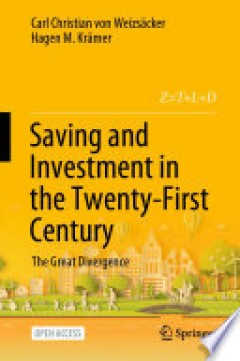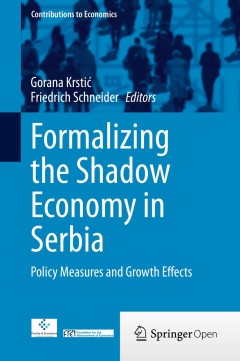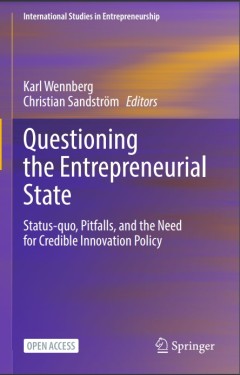Filter by

Saving and investment in the twenty-first century : the great divergence
This open access book offers a new, capital-theoretical perspective on the macroeconomic relationship between desired wealth and investment, and it presents new empirical data on private wealth and its composition in the OECD plus China area. The authors argue that a free economic and social order can only be stabilized if the wealth aspirations of individuals are met under conditions of price …
- Edition
- 1
- ISBN/ISSN
- 9783030750312
- Collation
- xxi, 343p. : ill.
- Series Title
- -
- Call Number
- 339 CAR s

Indian agriculture towards 2030 : pathways for enhancing farmers' income, nut…
This open access book brings together varying perspectives for transformational change needed in India’s agriculture and allied sectors. Stressing the need of thinking for a post-Green Revolution future, the book promotes approaching this change through eight broad areas, indicating the policy shifts needed to meet the challenges for the coming decade (2021-2030). The book comprises of ten…
- Edition
- Ed. 1
- ISBN/ISSN
- 9789811907630
- Collation
- XV, 311
- Series Title
- -
- Call Number
- 338.1854 Ind

Using evidence in policy and practice : lessons from Africa
This book asks how governments in Africa can use evidence to improve their policies and programmes, and ultimately, to achieve positive change for their citizens. Looking at different evidence sources across a range of contexts, the book brings policy makers and researchers together to uncover what does and doesn’t work and why. Case studies are drawn from five countries and the ECOWAS (west …
- Edition
- -
- ISBN/ISSN
- 9781003007043
- Collation
- xxvi + 254 p
- Series Title
- -
- Call Number
- 320.6096 USI u

Next generation supply chains : a roadmap for research and innovation
This open access book explores supply chains strategies to help companies face challenges such as societal emergency, digitalization, climate changes and scarcity of resources. The book identifies industrial scenarios for the next decade based on the analysis of trends at social, economic, environmental technological and political level, and examines how they may impact on supply chain processe…
- Edition
- -
- ISBN/ISSN
- 9783030635053
- Collation
- XVI, 290 p
- Series Title
- -
- Call Number
- 658.5 ROS n

Central Bank Policy Mix: Issues, Challenges, and Policy Responses: Handbook o…
This book is an integration of keynote speeches, lectures, and related teaching materials during the five years of the "Central Bank Policy Mix: Issues, Challenges and Policy Responses" flagship program of the BI Institute, the learning and research centre of Bank Indonesia. The book examines the interactions among central bank policies including monetary policy, exchange rate policy, macroprud…
- Edition
- -
- ISBN/ISSN
- 9789811668272
- Collation
- XIX, 280p; ill
- Series Title
- -
- Call Number
- 332.11 WAR c

Guidebook to carbon neutrality in China
This Open Access publication focuses on China’s goal of achieving peak carbon emissions in 2030 and carbon neutrality by 2060. The book is the first to systematically build a framework combining a top-down and bottom-up analysis of this acute topic. What does carbon neutrality mean for economics in China? Might it imply stagflation or is it an opportunity to maximize the potential of green…
- Edition
- -
- ISBN/ISSN
- 9789811690242
- Collation
- xliv; 335 PG; ill.
- Series Title
- -
- Call Number
- 363.7387 GUI g

Globalization and Economic Diversification : Policy Challenges for Economies …
This book is available as open access through the Bloomsbury Open Access programme and is available on bloomsburycollections.com. This volume brings together new contributions from renowned academic scholars, from experts on economies in transition and from the United Nations, the European Union, the European Bank for Reconstruction and Development as well as other international agencies. It ai…
- Edition
- -
- ISBN/ISSN
- 9781849665766
- Collation
- 264p : ill
- Series Title
- -
- Call Number
- 330.1260947 GLO g

Formalizing the Shadow Economy in Serbia: Policy Measures and Growth Effects
This report presents the results and recommendations of a comprehensive study of the shadow economy in Serbia prepared by the Foundation for the Advancement of Economics for the USAID Business Enabling Project (BEP). The report is based on the results of an analysis of the relevant statistical data, information obtained from the Survey on Conditions for Doing Business carried out on a sample of…
- Edition
- -
- ISBN/ISSN
- 9783319134376
- Collation
- 179p. : ill
- Series Title
- -
- Call Number
- 338.94971 FOR f

Questioning the Entrepreneurial State
The 2008 financial crisis and the COVID-19 pandemic have made the authorities to increasingly turn inward and use ethnocentrism, protectionism, and top-down approaches to guide policy on trade, competition, and industrial development. The continuing aftereffects of such policies range from the rise and seeming success of authoritarian states, rise of populist and protectionist trends, and evolv…
- Edition
- 2
- ISBN/ISSN
- 9783030942731
- Collation
- xi; 367p;
- Series Title
- -
- Call Number
- 658.421 QUE K

HUMAN CAPITAL VERSUS BASIC INCOME : ideology and models of anti-poverty progr…
Latin America underwent two major transformations during the 2000s: the widespread election of left-leaning presidents (the so-called left turn) and the diffusion of conditional cash transfer programs (CCTs)—innovative social programs that award regular stipends to poor families on the condition that their children attend school. Combining cross-national quantitative research covering the ent…
- Edition
- -
- ISBN/ISSN
- 9780472902774
- Collation
- xv, 288 p. : ill.
- Series Title
- -
- Call Number
- 130.63 BOR h
 Computer Science, Information & General Works
Computer Science, Information & General Works  Philosophy & Psychology
Philosophy & Psychology  Religion
Religion  Social Sciences
Social Sciences  Language
Language  Pure Science
Pure Science  Applied Sciences
Applied Sciences  Art & Recreation
Art & Recreation  Literature
Literature  History & Geography
History & Geography